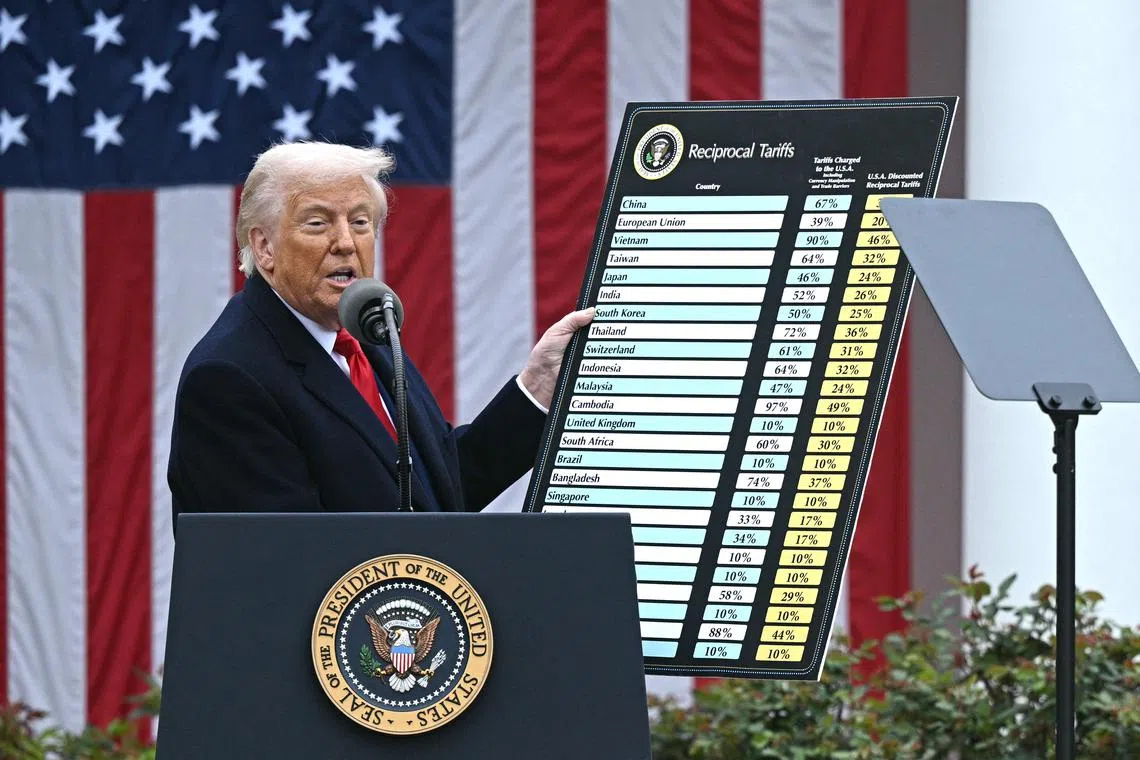US trade court blocks Trump’s ‘Liberation Day’ tariffs
Sign up now: Get ST's newsletters delivered to your inbox

A US federal court ruled that President Donald Trump overstepped his authority by imposing across-the-board duties on imports from nations that sell more to the US than they buy.
PHOTO: AFP
NEW YORK - A US federal court on May 28 blocked President Donald Trump’s “Liberation Day” tariffs from going into effect, ruling that he overstepped his authority by imposing across-the-board duties on imports from nations that sell more to the United States than they buy.
The Court of International Trade said the US Constitution gives Congress exclusive authority to regulate commerce with other countries and that is not overridden by the president’s emergency powers to safeguard the US economy.
“The court does not pass upon the wisdom or likely effectiveness of the President’s use of tariffs as leverage,” a three-judge panel said in the decision to issue a permanent injunction on the blanket tariff orders issued by Mr Trump since January.
“That use is impermissible, not because it is unwise or ineffective, but because (federal law) does not allow it.”
The judges also ordered the Trump administration to issue new orders reflecting the permanent injunction within 10 days.
The Trump administration minutes later filed a notice of appeal and questioned the authority of the court.
The court invalidated with immediate effect all of Mr Trump’s orders on tariffs since January that were rooted in the International Emergency Economic Powers Act (IEEPA), a law meant to address “unusual and extraordinary” threats during a national emergency.
The court was not asked to address some industry-specific tariffs Mr Trump had issued on automobiles, steel and aluminium, using a different statute.
The decisions of the Manhattan-based Court of International Trade, which hears disputes involving international trade and customs laws, can be appealed at the US Court of Appeals for the Federal Circuit in Washington DC, and ultimately, the US Supreme Court.
Trade turmoil
Mr Trump has made charging US importers tariffs on goods from foreign countries the central policy of his ongoing trade wars, which have severely disrupted global trade flows and roiled financial markets.
Companies of all sizes have been rocked by Mr Trump’s swift imposition of tariffs and sudden reversals as they seek to manage supply chains, production, staffing and prices.
A White House spokesman on May 28 said US trade deficits with other countries constituted “a national emergency that has decimated American communities, left our workers behind, and weakened our defence industrial base – facts that the court did not dispute”.
“It is not for unelected judges to decide how to properly address a national emergency,” Mr Kush Desai, the spokesman, said in a statement.
Financial markets cheered the ruling
The US dollar rallied following the court’s order, surging against currencies such as the euro, yen and the Swiss franc, in particular.
Wall Street futures rose, as did equities across Asia.
The ruling, if it stands, blows a giant hole through Mr Trump’s strategy to use steep tariffs to wring concessions from trading partners.
It creates deep uncertainty around multiple simultaneous negotiations with the EU, China and many other countries.
Mr Trump has promised Americans that the tariffs would draw manufacturing jobs back to US shores and shrink a US$1.2 trillion (S$1.6 trillion) US goods trade deficit, which were among his central campaign promises.
Without the instant leverage provided by the tariffs of 10 per cent to 54 per cent or higher, the Trump administration would have to find new forms of leverage or take a slower approach to negotiations with trading partners.
Businesses hurt
The ruling came in a pair of lawsuits, one filed by the non-partisan Liberty Justice Centre on behalf of five small US businesses that import goods from countries targeted by the duties, and the other by 13 US states.
The companies, which range from a New York wine and spirits importer to a Virginia-based maker of educational kits and musical instruments, have said the tariffs will hurt their ability to do business.
The trade court wrote in its decision: “There is no question here of narrowly tailored relief; if the challenged tariff orders are unlawful as to plaintiffs, they are unlawful as to all.”
At least five other legal challenges to the tariffs are pending.
Oregon Attorney-General Dan Rayfield, a Democrat whose office is leading the states’ lawsuit, called Mr Trump’s tariffs unlawful, reckless and economically devastating.
“This ruling reaffirms that our laws matter and that trade decisions can’t be made on the President’s whim,” Mr Rayfield said in a statement.
Mr Trump has claimed broad authority to set tariffs under the IEEPA.
The law has historically been used to impose sanctions on enemies of the US or to freeze their assets. Mr Trump is the first US president to use it to impose tariffs.
The Justice Department has said the lawsuits should be dismissed because the plaintiffs have not been harmed by tariffs that they have not yet paid, and because only Congress, not private businesses, can challenge a national emergency declared by the president under the IEEPA.
In imposing the tariffs in early April
Many of those country-specific tariffs were paused a week later
The Trump administration on May 12 said it was also temporarily reducing the steepest tariffs on China while working on a longer-term trade deal. Both countries agreed to cut tariffs on each other for at least 90 days. REUTERS


